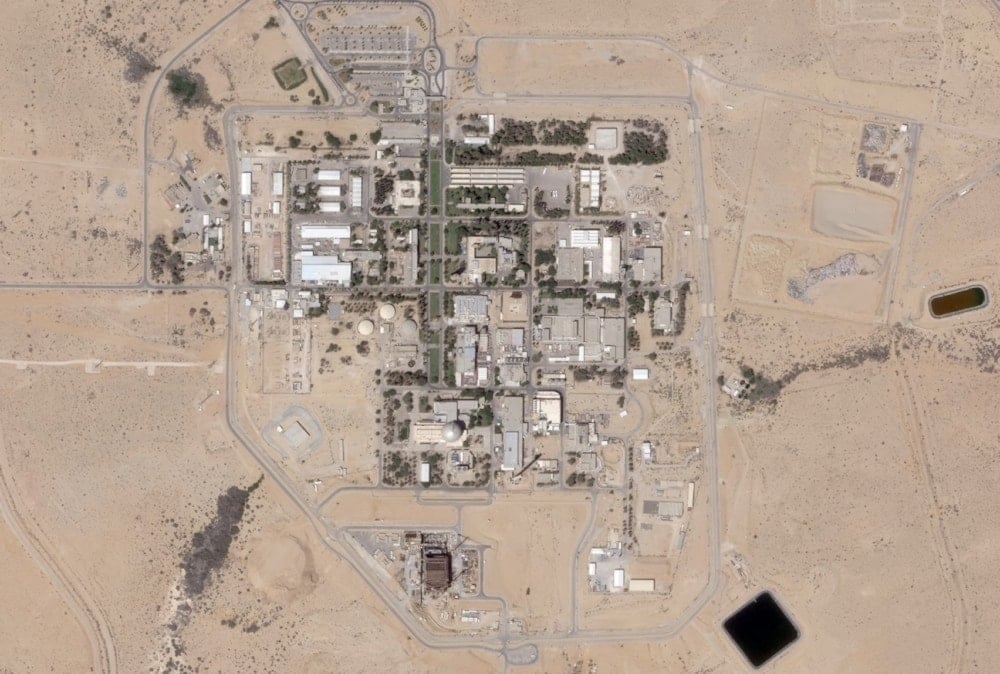Arab League chief exposes secret US deal shielding 'Israel’s' nukes
Aboul Gheit accuses Washington of misleading Arab states on nuclear disarmament, revealing a secret US-Israeli pact shields Tel Aviv's undeclared nuclear arsenal.
-

This satellite photo provided by Planet Labs PBC shows the Shimon Peres Negev Nuclear Research Center near the city of Dimona, occupied Palestine, July 5, 2025. (Planet Labs PBC via AP)
Arab League Secretary-General Ahmed Aboul Gheit has revealed what he described as a “secret agreement” between the United States and “Israel,” under which Washington pledged to remain silent about “Israel’s” nuclear arsenal in exchange for its permanent secrecy.
In a televised interview with Egypt’s Sada El-Balad channel, Aboul Gheit explained that “the agreement stipulates that Israel pledges never to speak, no matter how many centuries pass, about its nuclear arsenal, while America, in turn, promises to remain silent.”
For decades, "Israel" has maintained one of the world’s most secretive #nuclear programs; never declared, never inspected, and always protected by powerful allies.
— Al Mayadeen English (@MayadeenEnglish) June 8, 2025
Yet, on June 7, #Iran hit "Israel" hard by obtaining a treasure trove of intelligence against it, which reportedly… pic.twitter.com/uJepMycEbM
The Arab League chief accused Washington of deceiving Arab nations, recalling meetings in Cairo and Washington where US officials urged Egypt to ratify the Nuclear Non-Proliferation Treaty (NPT) in return for US pressure on “Israel” to follow suit. “Egypt refused,” he said, noting that such pressure “never materialized.”
US protects Israeli nuclear weapons
Aboul Gheit attributed the global silence surrounding “Israel’s” undeclared nuclear weapons to US protection, describing “Israel” as being “shielded by the dominant military-political pole that has ruled the world since the Soviet Union’s collapse in 1990.”
The former Egyptian foreign minister further explained that Cairo has deliberately refrained from ratifying conventions on chemical or biological weapons, emphasizing that it “saw no need for a nuclear deterrent” because “its drawbacks far outweigh any potential benefit.”
He added that Egyptian diplomacy has consistently advocated for a Middle East free of weapons of mass destruction, asserting that international inspections of “Israel’s” nuclear facilities could become “inevitable".
Aboul Gheit concluded by warning that such developments could trigger a regional existential crisis, compelling Washington to reconsider its long-standing protection of “Israel,” noting that “Israel couldn’t even use its nuclear weapons during the 1973 war.”
Dimona facility gets upgrade: Is 'Israel' hiking its nuclear program?
Satellite imagery has revealed intensified construction work at the Shimon Peres Negev Nuclear Research Center, a site long believed to be central to "Israel's" clandestine nuclear weapons program. The facility, located near the city of Dimona in the Negev desert, is drawing renewed international attention amid signs that "Israel" may be advancing its nuclear capabilities, as The Independent had speculated in September.
The latest images, captured on July 5 by Planet Labs PBC, show expanded activity at the site, including what appears to be a deep underground facility with multiple levels. Thick concrete retaining walls and large cranes are visible, indicating major development at a previously excavated area. Analysts suggest that this could signal the construction of a new heavy water reactor or possibly a facility for assembling nuclear warheads.
This comes after earlier satellite images in 2021 showed the initial stages of digging, a rectangular hole approximately 150 meters long and 60 meters wide, near the site’s original heavy water reactor.
According to the report, seven nuclear experts who reviewed the satellite imagery agreed that the construction is likely connected to "Israel's" long-suspected nuclear weapons program. Three of them suggested the size and structure of the construction area indicate it is most likely a new heavy water reactor. These reactors are capable of producing plutonium, a key ingredient in nuclear weapons.
The remaining four experts also acknowledged the possibility of a reactor but proposed that the construction could involve a nuclear warhead assembly facility, though they noted the project is still in its early stages and definitive conclusions are premature.
“It’s probably a reactor — that judgment is circumstantial, but that’s the nature of these things,” said Jeffrey Lewis of the James Martin Center for Nonproliferation Studies. “It’s very hard to imagine it is anything else.”
Lack of international oversight fuels speculation
"Israel" maintains a policy of nuclear ambiguity, neither confirming nor denying the possession of nuclear weapons. The occupation entity has never signed the Nuclear Nonproliferation Treaty (NPT), making it one of only four countries outside the agreement. As a result, the International Atomic Energy Agency (IAEA) has no authority to inspect the Dimona facility, aside from the separate Soreq research reactor.
The IAEA, when asked about the construction, reiterated that "Israel" is not obligated to provide details about any nuclear facilities other than Soreq.
“Israel doesn’t allow any international inspections or verification of what it’s doing, which forces the public to speculate,” said Lyman.
'Israel's' nuclear ambiguity, regional impact
The facility at Dimona was first built in the late 1950s, following multiple wars with neighboring Arab states after the establishment of "Israel" in 1948. Since then, the program has remained shrouded in secrecy. In the 1980s, whistleblower Mordechai Vanunu exposed photos and details from inside the site, leading international experts to estimate that "Israel" possesses dozens of nuclear warheads.
The Bulletin of Atomic Scientists estimated in 2022 that "Israel" holds around 90 nuclear warheads. It is believed to rely primarily on heavy water reactors for plutonium production, similar to India and Pakistan.
This development comes shortly after joint US-Israeli airstrikes in June targeted nuclear facilities across Iran, including the heavy water reactor at Arak, citing concerns over Tehran’s potential nuclear ambitions.
With no international oversight and little transparency, the expanded construction at the Dimona nuclear facility deepens existing concerns about the nature and scale of "Israel’s" nuclear arsenal, and what its continued growth may mean for regional and global stability.

 5 Min Read
5 Min Read










